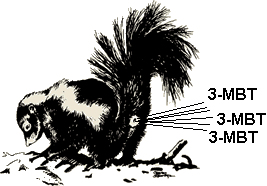It is a chemical reaction triggered by light. Skunky beer flavor is attributed to the compound 3-methylbut-2-ene-1-thiol or for easier notation furfuryl mercaptan. This is the same compound (mercaptan) that is found is skunk spray. We humans have a very low flavor threshold for mercaptan, we can detect its presence in quantities as small as .004 micrograms per liter. When beer is exposed to bright sunlight, significant quantities of mercaptan can form in mere minutes.

Specifically, what happens is riboflavin, which is produced by yeast during fermentation, absorbs energy from light at wavelengths of 350 to 500 nanometer. The riboflavin transfers the energy to iso-alpha acids (bittering compounds produced by boiling hops) which release free radicals that react with yeast derived sulfur compounds. Probably not coincidentally, amber colored glass, blocks the offending light wavelengths under 500 nanometers, which is why most beers don't have the skunky smell. While beers like Corona (clear glass packaging) and Heineken (green glass) have mercaptan as a central flavor characteristic. This is also why people are encouraged to stick limes in Corona bottles, in order to cover up the skunk stench. If you want to try an experiment, buy two six-packs of Heineken, one in cans and one in green glass bottles. Set them both in the sunlight for 10 minutes then taste them. The beer in the bottle should have a noticeable "skunky" smell compared to the cans.

Where else can we find this mercaptan? We find it in a step up from Corona... our urine. Specifically that smelly urine you get after eating asparagus. The culprit in asparagus is asparagusic acid, which produced methyl mercaptan in urine. A strange fact about this is that only 40% of the UK population produces this chemical in their urine, while 100% of the French population does. Even stranger is that 90% of the Israeli population and 75% of the Chinese, have no ability to smell the mercaptan-laced urine. Which begs the question, do people who like Corona also lack the ability to smell mercaptan, or do they just like the smell of skunk spray and urine? Who's to say.
never trust The Sober Brewer
Jerry Gnagy


7 comments:
Aweome explaination! Thanks!
The lime in Corona was to remove rust from the bottle lip caused by caps in the older days.
Sulfur is what is in asparagus.
This article is BS
www0817
ray ban sunglasses
クロムハーツ
fitflops sale clearance
kate spade outlet
red bottoms
salomon
air max 90
ugg boots
nfl jerseys
giuseppe zanotti
www1105
pandora outlet
new balance shoes
jordan shoes
air max 90
mlb jerseys
christian louboutin outlet
click to read moreclick this link here now see it hereadvice great post to readhis response
you could try these out Ysl replica you could try here replica designer bags more tips here high end replica bags
Recommended Reading 7a replica bags wholesale see page Louis Vuitton fake Bags their explanation louis vuitton replica
Post a Comment